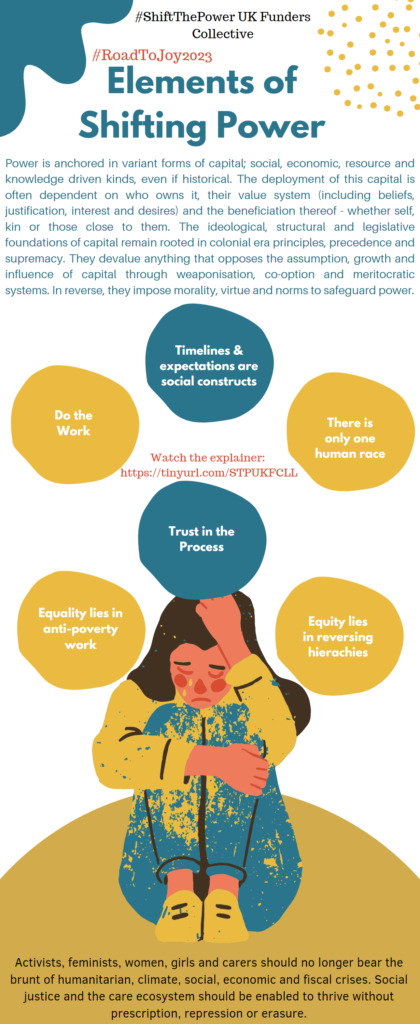I have had the pleasure to serve a as a Facilitator of the #ShiftThePower UK Funders Collective. From the very first interview, I was in awe of the vision and clear intention that the co-convenors had when they mobilised support from the National Lottery Fund UK and Indigo Trust to mobilise someone from the Majority* World, embarking on a journey that focused on the intricacies of transformation and meaningful change as opposed to the destination. Weekly calls that have spanned more than a year and half have explored the many facets of different societies, geopolitical developments, court judgments from different jurisdictions, mapping the plethora of initiatives that are working towards shifting power (even when not named so) and exploring conversations with funder networks, practitioners and leaders. There is a clear intention towards changing the norm. However, what continuously emerges in our conversations; is it enough? We have recognized the importance of calling out when necessary, but also how calling in can be meaningful for transformation. Creating the space for different stakeholders to be a part of the broader #ShiftThePower movement is no easy task. Competing against zoom fatigue, business as usual, prejudice and normative discourse has been a difficult part of the journey. When we met in person in March 2022, after several postponements due to Omnicron, my own personal crises ranging from police harassment and having to care for family, questioning how meaningful and impactful carving out a space can be, the resolve is clear: we need to bridge, link and enable different thematic issues, stakeholders, enablers and activists in this journey.
It was the first time I found myself being held in my full self with care and compassion when pressured or simply failing at life. The intentional solidarity, sharing intricacies of harmful practices and bringing in lived experiences to the conversation has been invaluable, as I have been told. I say this because when you’re a queer, migrant and bipolar individual, you have to consistently interrogate intersectionalities of your experiences. As it has been impossible to separate my several hats, weaving in lessons learned from Partos’ Power Shift Labs, Voice Global’s Advisory Board, the RINGO Labs, CIVICUS’ Grassroots Solidarity Revolution as a critical friend, the Institute of Economic Justice’s Feminist Economics School, the African Philanthropy Conference, the African Philanthropy Network, GFCF’s #ShiftThePower convening and Accountable Now’s Power Shift, Annual Workshop and Board efforts. We have navigated these lessons learned amidst pandemic hard lockdowns, anti-racist, feminist, democratic and anti-militarisation movement civic action, economic crises, vaccine inequities, visa injustices and three Prime Ministers in the UK. An unimaginable, exhausting and trauma-filled world that has put our bodies, psyches and rights in harm’s way. Public statements, equality-driven policies, anti-racist workshops, representation hires and diversity drives have not been enough. The surge in pandemic response measures and flexibility has narrowed and remained elitist, ableist and in proximity to white supremacy. There are intergenerational and ideological conflicts impacting how health security, jurisprudence and multilateralism are denied for many regardless of whether in the Larger World or not.
The reality is we are still stuck in the development industrial complex of M&E indicators, intellectualisation and dehumanizing the experiences of those we share the planet with. The last time I had medical aid was in early 2019, whilst working in corporate. Something so simple, whilst glaring when coupled with expertise on the normative aspects of human rights and sustainable development work has changed the dynamic of conversations in unimaginable ways. It triggered how decisions are made for some, approaches to strategic processes and the language used in other spaces. These are things, in consensus with the co-convenors from our first conversation; can never be articulated on a CV. Similarly, the impact one can have on an institution after doing the unpaid work of calling out, educating and bearing the consequences in other/related consortia, networks and enablement mechanisms. These are the realities of BIPOC folks the world over. Where our realities are not meant for evidence-based decision making or meritocracy. Where the institutionalisation of our experiences is limited to binary forms of co-option or weaponisation when inconvenient. Where the socialization of our existence can be criminalized or denied the universality and indivisibility of human rights. This is the reason why we have found it important to being different stakeholders, perspectives and dreamers together. That we can move away from the norms of project based, well funded and donor only spaces and programmes. The humility of the co-convenors insisting on not setting up a structure, not wanting to be on the programme or mobilizing resources to perpetuate hierarchy has resonated and reflected with a much younger Dumi. Who hoped that there would never be ownership of change or impact. That the seeds of change can be planted with those who already have the know how and lived experience to navigate the many structural injustices and inequities that uphold privilege, power and patriarchy. I am certainly looking forward to expanding these conversations, issues and ideas with many others. Underpinned by Joy, our party (not conference) will inspire for collaboration and action among those already doing the work. Our dancefloors (not panels or sessions) will explore the variant elements of power through thematic issues, expertise and experiences for shared learning, solutions building and unpacking what joy can look like from their diverse perspectives. I am certainly hoping that in the end, for both virtual and in person hybrid parties, folks can ask themselves as Dilhani Wijeyesekera did with us back in March 2022, “are you revolutionary enough?”. I look forward to holding questions, celebrating unintended outcomes and critiquing structural systems in the only way videos, speeches and influences of Toni Morrison, Stella Nyanzi, Winifred Zanyiwe Madikizela-Mandela, James Baldwin, and Miriam Makeba have taught me; with care, compassion and excellence!
* The term ‘Majority world’ highlights the fact that the majority of the world’s population lives in these parts of the world traditionally referred to as ‘developing’. : https://sadafshallwani.net/2015/08/04/majority-world/



